#so she gets tolstoy
Text

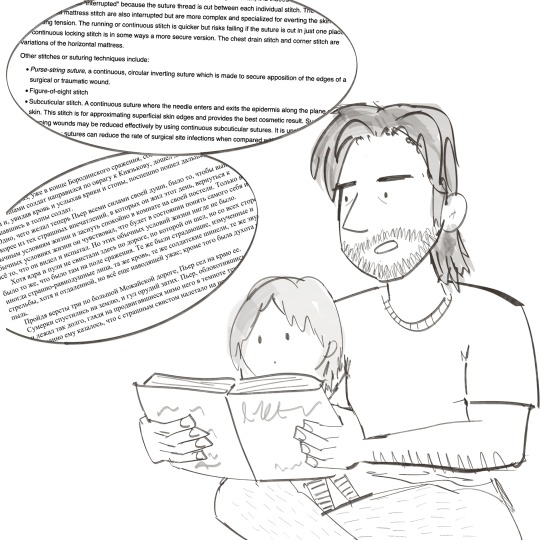
all fun and games raising a genius child until you realise you forgot to teach her anything normal
later:

#subtly presenting my hc that dave wants sunny to know russian in honor of olga 🥺 except he doesn't know what 'age-appropriate' means#so she gets tolstoy#she’s so tiny in these lmao picture her like age 2-3#also raiden did not immediately disappear after saving her what are you talking about?? he visited all the time to babysit haha 🙃#mgs#metal gear solid#otasune#sunny emmerich#solid snake#otacon#raiden#jupiter family#snotacon#my art#metal gear fanart
277 notes
·
View notes
Text
I'm trying to articulate a thought: while a moral reading of a text is necessary and I'd say unavoidable, a judgement of a text cannot begin and end in its value as a didactic piece for teaching morality to the reader (or reinforcing their sense of moral selves).
This doesn't mean people should read books that make apology of things the person finds morally or psychologically repulsive, just because there's some artistic value in them anyways.
But I have seen people for whom reading (and engaging with media in general) becomes a moral race in which their enjoyment of literature must be thoroughly justified by the -often only superficially ascertained- moral value of the themes and lessons of the text, and for whom the things they read are a letter of presentation of the moral principles they spouse.
In other words, instead of the moral principles of the person delineating the framework through which they approach the text, it is a checklist of things the text must explicitly contain in order to be seen as having any worth at all.
Which is a rather sad and superficial way to engage with things.
#Pick say Dracula#to mention a book I disliked#yes part of my dislike is the treatment of Mina's character and also the approach of the lower class characters and the foreigner danger#But also the book has a very strong promising first half that quickly descends into idiot ball convenience so that Mina can get bitten#And it goes downhill from there#I can understand why people enjoy the novel#And also point out the futility and delusion of trying to say that Bram Stoker had a feminist and inclusive perspective of women#The book can be written by an author that doesn't care about women and it bleeds through the text#and you still can derive enjoyment of the interesting concepts characters and dynamics in it#That won't make you a bad person you don't need to force the text into being PureTM#The other way around#yes War and Peace features two adult men falling in love with a young teenage girl and that's yikesy#But it's also a story about how she represents life#and the way their relationship with life creates a contrast and a reflection about the meaning of life and love#Is this a good treatment of Natasha? No!#Does that mean that the whole book is bad because Tolstoy was a bad husband and in general not good to women? Also no!#So yeah it boils down to#you can enjoy quote unquote problematic media and be a good person#Your reading list does not define your morality#The way you engage with the text on the other hand yes can tell things about what you believe and the principles that direct your behavior
20 notes
·
View notes
Text
"Fanfic isn't REAL literature, a lot of fanfic is bad quality, writing fanfic makes you a bad writer and reading it makes you a bad reader" okay. Regardless of if ANY of that is true: are people having fun reading it? Are they having fun writing it? Not all art is trying to change the world and not all art needs to.
#Cipher talk#Trashy low brow/low quality art is always going to exist and a lot of people are going to enjoy it#Not all fanfic is good but like... a lot real 'published literature' is dogshit too#As everyone complaining about booktok and the current state of YA should be well aware#Not everyone is Tolstoy and not everyone is constantly reading Tolstoy#Even people who LOVE Tolstoy read stuff that isn't that kind of literature or quality#Do you yell at teenagers who make shitty art with bad proportions and teenagers that like looking at it too?#Do you walk up to the knitting circle and destroy Stacy because she can't keep tension throughout the scarf she's making?#Making bad art generally speaking does not hurt people#And there are actual like. Good fic writers. Good fic writers that wrote good original work too. Is this everyone? No.#But fanfic has no barrier to entry so of course plenty of it is bad or middling#It's a similar thing to audio drama tbh but I won't get into that#Like. Hhhg. Art is a complicated subject but I do not see the point in whinging about people that like a niche form of writing
6 notes
·
View notes
Text
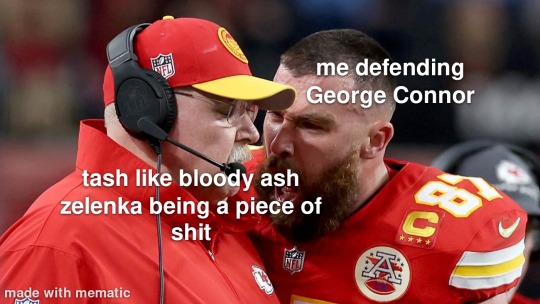
#this book is making me so anxious#the mc makes me want to claw my eyes out#she treats george like he's horrible and it's obvious she sounds like a fucking bully#honestly#this could have been an ace/ace cute romance book with george being ace and tash being ace and the two getting to know each other and#honestly istfg#if the author is allo then I'm entitled to financial compensation#tash hearts tolstoy
1 note
·
View note
Text
Letter to a Lost Friend
by Barbara Hamby
There must be a Russian word to describe what has happened
between us, like ostyt, which can be used
for a cup of tea that is too hot, but after you walk to the next room,
and return, it is too cool; or perekhotet,
which is to want something so much over months
and even years that when you get it, you have lost
the desire. Pushkin said, when he saw his portrait by Kiprensky,
“It is like looking into a mirror, but one that flatters me.”
What is the word for someone who looks into her friend’s face
and sees once smooth skin gone like a train that has left
the station in Petersburg with its wide avenues and nights
at the Stray Dog Cafe, sex with the wrong men,
who looked so right by candlelight, when everyone was young
and smoked hand-rolled cigarettes, painted or wrote
all night but nothing good, drank too much vodka, and woke
in the painful daylight with skin like fresh cream, books
everywhere, Lorca on Gogol, Tolstoy under Madame de Sévigné,
so that now, on a train in the taiga of Siberia,
I see what she sees — all my books alphabetized and on shelves,
feet misshapen, hands ribbed with raised veins,
neck crumpled like last week’s newspaper, while her friends
are young, their skin pimply and eyes bright as puppies’,
and who can blame her, for how lucky we are to be loved
for even a moment, though I can’t help but feel like Pushkin,
a rough ball of lead lodged in his gut, looking at his books
and saying, “Goodbye, my dear friends,” as those volumes
close and turn back into oblong blocks, dust clouding
the gold leaf that once shimmered on their spines.
338 notes
·
View notes
Text
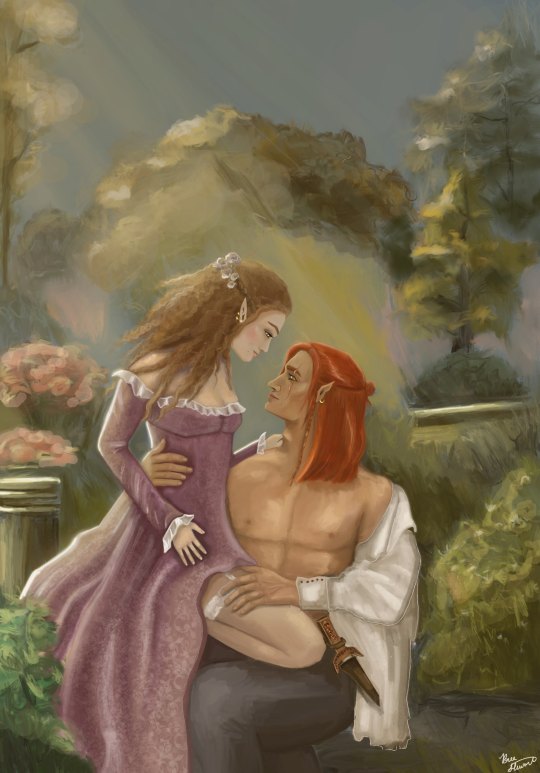
“He could not be mistaken. There were no other eyes like those in the world. There was only one creature in the world who could concentrate for him all the brightness and meaning of life. It was she.”
- Leo Tolstoy, Anna Karenina
In collaboration with @crazy-ache, we commissioned @dangerouslovesong to create this beautiful Elucien piece.
The vision: we have become a little obsessed with 1970-80s romance clinch covers. Not only are the poses romantic and sensual, but the artistry is exquisite. When @dangerouslovesong started her hand at Elucien fanart a few months back, she told me she was inspired by those covers and wanted to try tackling this challenging style. So, a few weeks ago, we all put our heads together to come up with a design and she executed this really magnificent piece!
She even did a worn book cover version!
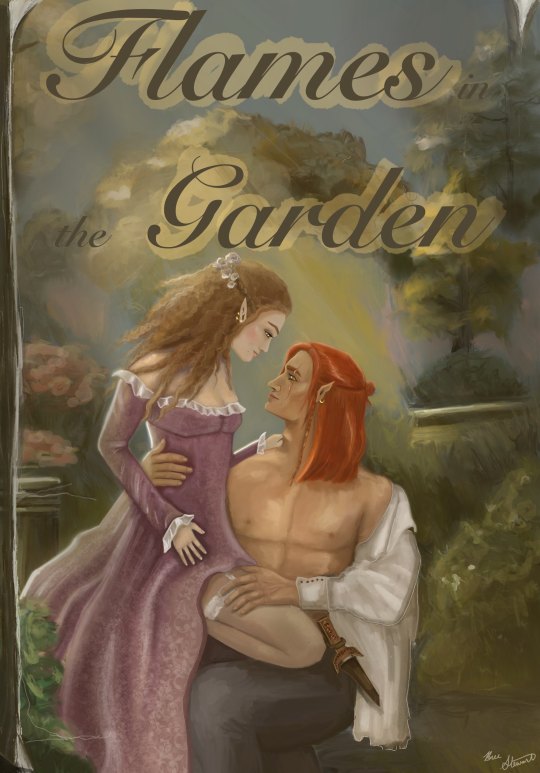
We thought what with the book announcement looming and fandom getting tense, having a little dreamy version of our own Elucien book would be fun. I personally think she captured the romanticism of the art style perfectly.


Some close ups for you all to appreciate some of the details.
#elucien#lucien vanserra#elain archeron#elain x lucien#pro elucien#elucien fanart#acotar#acotar fanart#elucien supremacy
162 notes
·
View notes
Note
My request is a bit odd, but could you do a ghost x reader where it's late at night drinking coffee/tea and there just talking about soft things, specifically the reader just saying. " I'm really glad to have met you. " And ghost scoffs " why are you saying as if your going to die?"
“soft ramblings over tea”
includes: fluff, simon opening up, tw death
words: 1.2k
It’s the night before Simon has to leave you, yet again.
Because that’s what your relationship with him is; a series of lows whenever he has to leave, and peaks of elation whenever he comes back to you.
He’s been trying to distract you from the reality of it all day. Doing the laundry with you (your favorite chore), ordering pizza, putting on that new film you’d wanted to see. But now the night has started to set, and he’s got to check his bag to make sure he has everything he needs.
You’ve offered to help with going over the checklist.
He shakes his head, telling you, “Make us some tea. I’ll be done soon.”
You boil the water and find two mugs. Hearing the sounds of him shuffling around as he packs invites a hot, stinging moisture to your eyes. He’s so much better at this than you are. You wonder if it will ever get easier. After two years, you decide that even with all the challenges your relationship has brought, saying goodbye like this was easily the worst one.
Soon, the house will be empty. His scent in the sheets will fade.
You pick out the tea bags: earl grey for him, chamomile for yourself.
Simon’s just finished zipping up his bag when you walk in the bedroom with the two warm mugs in tow.
“Perfect timing,” he rasps, but quickly notices the faded redness in your eyes. Instead of commenting on it, he decides to pat the bed. “Come on, sit here with me.”
Handing him his mug, you sit on the bed next to him. His body radiates almost as much heat as the tea, and it relaxes you. You sit with your legs crossed, knee touching his, and both of you are already in your pajamas for the night. You’re certain you won’t be getting good sleep, if any.
“Do you remember when we first met?” Simon asks, splaying a hand over your knee. He lifts his mask up just to take a sip from his mug.
“It’s not something I like to remember,” you utter, a flush to your cheeks. “I nearly ran you over with my bike.”
“Coordination isn’t your thing, pet,” he hums low. “Can’t complain, can we? Led to good things.”
He’s distracting you, but you welcome it. He rubs his rough thumb over your skin and tells you about little things that he’s never mentioned before. Seeing you as the sad one, stuck in your thoughts, urges Simon to do the talking for once. He tells you how he remembers what clothes you were wearing that day you’d met, and how he remembers you telling him all the names of your childhood pets one time and that he can list them all back to you.
“What?” You shake your head. “No, there is no way you were actually listening to all that.”
“You think I don’t listen?” he huffs. Eyebrow raised, Simon informs you, “I’ve got a damn good memory. That bunny of yours, the one that ran away, was named Shoeshine.”
Your tongue pokes your cheek. “And the goldfish?”
“Easy,” Simon says plainly. “Tolstoy, for some reason.”
“He just looked like a Tolstoy to me,” you whisper through a sheepish smile. Distracting you seems to be another one of Simon’s precise talents, or maybe you’re an easy target, because now your chest is fluttering and the redness in your eyes is gone.
Now that you’ve softened, you start to do the talking. You tell him about your cousin’s engagement party next weekend. How excited you are to see your family members after so long, and how you’re pretty sure your cousin is actually just pregnant (“she’s only been seeing the bloke for six months”).
Simon is listening carefully, his eyes thoughtful, before he comments, “I’ve never met your family.”
“I wasn’t sure if you felt comfortable with that,” you explain to him, finishing the last sip of your tea. “Do you want to meet them?”
“Maybe I should,” he grumbles, though he’s already thinking about how he would have to do some serious mental preparation for that. “I mean, you don’t have to meet mine since they’re dead.”
You flinch. “Simon…”
“Just a fact,” he says, shrugging, and he was always saying that when he mentioned something dark so casually. “Do you… what do you think your family would think of me?”
You set your empty mug on the bedside table. “They would think you are a good man,” is all you say, because you know he’s probably overthinking it.
Sure, you’ll have to explain some things about him and your relationship before he met them. Particularly, why you’ve kept him hidden for over two years. And maybe also the mask that he wears. But your family would accept him just as you have.
Simon is about to say something when you scoot closer to him and peak into his mug. “You’ve got a lot left there,” you hum. “Could I try some of yours?”
Eyes flashing to the cup you just set down, he groans and pinches your hip. “You always do this. Finish yours and then come for mine.”
“You drink it so slow.”
“Fuckin’ hell, take a sip.”
After he offers you his mug, you somehow end up in his lap. Legs tucked to your chest and your head resting on his, you listen to the rhythmic sound of his heart as he silently finishes his tea.
The sound of it in your ear is enough to bring the impending thoughts back to you. His heartbeat calms you as much as it terrifies you. Somehow, it has grown to have so much power over you. If it stopped, if he didn’t come back to you this time, you wouldn’t know what to do with yourself. You would become a ghost of yourself, you think. Barely there.
It’s when your eyes start to flutter that you mumble to him, “Please don’t die on me.”
It’s weird to hear you say it. Simon can’t remember anyone else being so desperate for his survival. He’s finally got a reason to care about it himself: having you to come home to was one hell of a motivator.
“Don’t plan on it,” Simon says, planting a firm kiss to your forehead.
“I’m…” you reopen your eyes so you can look up at him. Fingers twisting the fabric of his thermal, you whisper, “I’m so glad to have met you…”
“Hey now,” Simon scoffs. “Why are you talking like that? Like you’re gonna die or something.”
You let out a small laugh, pitiful and playful, as you feel him cup your cheek.
“No one’s dying, yeah? Don’t be dramatic. You’ll be here when I get home, right where I left ya.”
#fluff#just fluff#simon ghost riley x you#simon riley x reader#simon ghost riley#call of duty#simon ghost riley x reader#fanfiction#thank you for the idea!
2K notes
·
View notes
Text
‘𝑪𝑨𝑼𝑺𝑬 𝑰’𝑴 𝒀𝑶𝑼𝑹 𝑱𝑨𝒁𝒁 𝑺𝑰𝑵𝑮𝑬𝑹, 𝑨𝑵𝑫 𝒀𝑶𝑼’𝑹𝑬 𝑴𝒀 𝑪𝑼𝑳𝑻 𝑳𝑬𝑨𝑫𝑬𝑹 — kai anderson



✧. headcanon tags: fem! reader. mention of murder. ꒰ dating kai anderson headcanons ꒱ ⨾

kai enjoys reading in his free time, (when he’s not plotting world domination)
his favourites are by machiavelli, tolstoy, nietzsche and shakespeare. he often quotes them in fucked up situations.
“good night, sweet prince, and flights of angels sing thee to thy rest.”
like when he tortured RJ with a nail gun, he quoted hamlet. that part killed me.)
so he expects you to read too so he can carry an intelligent conversation with you. quality time, like a two-person book club.
after all, the future mother of his messiah baby can’t be an ‘uneducated hoe’.
you should be grateful that at least he doesn’t demand you to hand in a five-page book report every week (yet).
x
super possessive and gets jealous very easily. if a cult member dared to look in your direction, well, too bad for them.
kai is very creative when it comes to punishments. in the cruelest, most horrific ways imaginable.
tolerant of pda. in public, he allows you to hold onto his arm. don’t expect him to reciprocate though, he doesn’t want to be regarded as a simp.
if he catches other men checking you out, he’ll put an arm around your waist or squeeze your ass in a possessive way. glaring daggers to remind those bastards that he owns you.
at home, he displays affection in the most subtle of ways: a hand on the small of your back, his chin resting on your shoulder as he inspects whatever food you’re cooking for him.
while watching cult documentaries together on the couch, his arms casually resting on the backrest, hand grazing against your shoulder.
idly playing with a strand of your hair during commercials.
you have each other’s initials tattooed on the inner side of your pinky fingers.
he took you to his dead parents’ bedroom and introduced you to his mother.
he lets you help dyeing/cutting his hair. only you and winter are allowed with that special‘privilege’.
x
dates with him always feel like they’re completely random and impromptu.
(that’s what he wants you to think. what would his followers think if they found out the divine ruler spends time planning out dates for his girlfriend?)
“get dressed. we’re leaving in five minutes.” is code for “i’m taking you out on a date but don’t you dare make a big deal out of it.”
if he gives you ten or fifteen minutes to prepare, it means he’s taking you somewhere upscale so you better look nice.
his eyes always give that slight flicker of approval when he sees you wearing that dress he loves seeing you in.
(already imagining that dress on the bedroom floor.)
“do i look okay in this dress?”
“i’d fuck you in it,”
“…”
x
kai is good at reading people, pinpointing their weaknesses and using them to his advantage. though with you, it's done in a less malicious manner. don’t get me wrong, he’s still controlling as hell, but it's his twisted way of showing care for you.
he remembers everything that you’ve ever told him about yourself. literally everything.
even though he generally appears to be disinterested or zoned out when you’re talking, he’s silently cataloging every piece of information about you in his head. for later use.
he plays dumb. pretends to know little about you, in hopes to extract more info.
but then he accidentally let slip the fact that remembers the name of your bitchy grade school teacher, whom you once mentioned ages ago.
“ugh, that old lady in the checkout line reminded me of-”
“your 3rd grade bitch teacher. mrs davenport.”
“Well yeah.. wait, how’d you even know-”
and he’s staring back at you with a blank expression like: ‘duh. you told me, stupid.’
x
winter is your number-one shipper.
you always manage to bring out the old kai. the brother she grew up with : sweet, awkward, and funny. those were fleeting moments, but better than nothing.
and she’s grateful that someone can actually put up with her screwed-up brother, so she’s constantly in dread that one day he’ll push too far and you’ll leave.
winter knows that kai cares a great deal about you, more than he’s ever willing to admit.
x
during fights, he can’t bring himself to yell at you for too long when you’re crying.
he’s witnessed the way his shitbag father had treated his mother. so he just stands there, jaw clenched, fists balled as he tries to control himself.
most of the time, he leaves the room quickly, for the both of you to calm down. which is probably for best.
on rare occasions, when winter is absolutely livid at his assholery and the way he treated you, he finally realises that he had went too far, so he comes looking for you, feeling a bit.. guilty.
when he sees your tear-stained face, he sighs, mumbles something like:
“ugh.. can’t believe you’re still crying.. c’mere.”
then he outstretches his arms to you, kiss the top of your head and holds tightly to you, as you sniffle into his chest.
that is when you know that he is truly sorry without saying the actual words.
that small gesture is the kai anderson equivalent of begging on his knees for your forgiveness.
it’s just that his ego won’t allow him to apologize like a normal person. so he makes up by being sweeter to you the rest of the day.
because if there’s anything that scares him more than bruising his ego, it’s the possibility of losing you.

fear-is-truth 2024 — all rights reserved. please do not modify, repost, translate, or plagiarise my content.
#american horror story#kai anderson#kai anderson x y/n#kai anderson x reader#ahs cult#ahs#ahs fandom#kai anderson headcanons#kai anderson x you#ahs fanfic#Kai Anderson imagines#ahs imagines
372 notes
·
View notes
Text
geto, gojo and the sun ☼
it’s pretty well established that geto and gojo are the suns of each other’s worlds. we know, and are reminded regularly, that the sun is a consistent motif in their relationship. despite this, the metaphor actually runs much deeper than what we see on the surface.
geto associates gojo with the rising sun. in the opening sequence, all of his moments with gojo are dappled with streaks of sunlight. when they’re on the bike, when they’re walking through jujutsu tech, when they’re poking each other’s faces or getting stuff from the vending machine— it’s all so bright.
for geto, gojo is the rising sun that parts his clouds, literally exemplified in the ending sequence when geto is impatiently waiting for gojo in the rain. not only does gojo bring an umbrella, (which he himself doesn’t need) after he picks up geto, they walk together into the sunlight. like a cloudy night, geto waits for the sun to return every morning.
contrarily, gojo associates geto with the setting sun. when they break up in front of the KFC, the sun is setting around them. gojo’s eyes, which usually shine so brightly in the sunlight, are dampened by the waning rays of the sun. in gojo’s memory of the breakup, there’s no sun at all— it’s completely grey.
for gojo, geto is like the setting sun in that no matter how far he extends his hand, he’ll never reach him (as mentioned in the light novel). gojo can only watch as geto slips into the horizon, bidding him farewell at every dusk as he takes all the light with him, leaving gojo alone in the night.
when gojo meets geto at the end of his life, the sun has almost completely set. as he’s dying, geto is illuminating the vestiges of the last sunny day gojo will ever have. the sun sets for the last time, and geto slips through his hands even as gojo uses them to kill him.
what’s interesting here is that both of them associate each other with the same thing. geto is the center of gojo’s universe, and vice versa. the setting sun becomes the rising sun— they're an ouroboros, cycling through day and night as one.
suns are also solitary creatures, doomed to be alone whilst being the most powerful thing in the universe. we need the sun to survive, but we can’t get too close or we’ll die. we can only admire the sun from afar, basking in its rays on the condition that we can never openly embrace its warmth.
i'm reminded of a tolstoy quote that speaks to the nature of the sun as a literary motif:
"he stepped down, trying not to look long at her, as if she were the sun, yet he saw her, like the sun, even without looking."
the sun is always around us, even if we can’t see it directly. geto and gojo may be apart, hidden by clouds or the horizon, but like the sun, they remain at the center of each other’s worlds— steadfast, ever-present and never waning.
(credit to @serenan2d on tiktok for providing the initial analysis that inspired this post. check her out, she’s amazing)
#my jjk meta#this is what i'm spending my expensive ass english degree on#and i have NO REGRETS#gege cooked with these two i fear#they're so beautifully written#satosugu#stsg#satosugu analysis#jjk meta#jujutsu kaisen meta#jujutsu kaisen analysis#satosugu angst#satoru x suguru#gojo satoru#geto suguru#goge#gego#jujutsu kaisen#jujutsu geto#jujutsu kaisen meta analysis#gojo meta#gojo analysis#gojo x geto#夏五#五夏#jjk suguru#jjk satoru#jjk satosugu#jujutsu kaisen suguru
119 notes
·
View notes
Note
Theodore nott x Gryffindor fem! Reader fluff and soft smut she’s reading in his lap while he’s leaning against the bedpost reading with her holding the book and Turing the pages while she keeps reading it and it’s super smutty (maybe the actors spin-off book abt nesta and cassian-) and she just traces his arm veins while they read (and if you decide to make it smutty pls make the reader LOVE LOVE LOVE his hands, abs, arm viens-)
Light Reading | T.N.

Author's Note: Sappy me really quick. Thank you, thank you, thank you to this person for requesting. My husband is gone until Friday and I am a lost puppy. I hope I did this story justice. ❤️ Requests open.
Theo smirked while walking around your room. A fire burned brightly in the fireplace. A sharp contrast from the harsh cold outside. The glow from the fire illuminated the most precious things that mattered to you. Accomplishments throughout your whole life displayed for any visitor to see. Pictures of you with your family and friends placed around various parts of the room.
He walked to your bookcase. The very bookcase you bragged so much to him about. Books of new and old neatly stacked vertically next to each other. He was amazed at the amount of books that were in your possession.
"I'm back," you announced with a sing-song tone. Theo noticed the two mugs of hot chocolate in your hands. You placed them down on the nightstand next to your bed. You sat on the edge of your bed waiting for him.
"One second, my love. I am going to get more comfortable," he told her. The fire in the room made it a little hotter than he liked. He removed his green sweatshirt allowing your eyes to scan over him. You didn't bother hiding that you were checking him out.
You couldn't help it. He had repeatedly told you that he worked out over the summer to get ready for the new Quidditch season. You believed him but this was different. His tall frame was usually covered by the pesky Hogwarts uniform.
You continued to stare at him. It felt as if you were in a trance. You didn't notice he was coming towards you until his brown eyes stared into yours. An amused expression captured on his face.
"It seems like you are interested in a little more than reading, darling," he teased. He leaned in and kissed you softly.
"I... I was just wondering how long it was going to take you to get in bed is all," you stuttered and looked away. Bright red burned your cheeks. He smiled in response.
Theo sat on the bed. His back leaned against the bed post. He patted his lap. You happily obliged the invitation. You sat on his lap and laid against him. He fingers ran through your hair before placing a soft kiss on your temple.
"What book did you decide?" He asked while playing with her hair.
"It's a surprise," she answered playfully. "A type of book we never read before. I could pick something like Austen or Chaucer if you want,"
"It's fine. I trust you made a good pick," he assured her. He reached for the book and held it for them in front of her. His chin rested against her shoulder. "Ready when you are,"
Your voice sounded in the quiet room as you read page by page. Theo turned the page each time you were finished. This book was certainly something you never picked before. Austen, Woolf, and Tolstoy would blush hearing these words.
Your fingers mindlessly traced the veins on his arms. Your lips found their way to his biceps. Kisses mixed with soft bites covered his skin. He watched her worship his arm.
"You've been quite mischievous tonight, my little lion. The book choice, staring at me while I undeessed and biting me," he whispered in you ear. You shifted in his lap so you were facing each other.
Theo closed the the book and placed it on the night stand. Strong muscular arms wrapped around your waist and pulled you closer. A trail of kisses left on your skin from your shoulder to you neck and ending at your lips.
His hands cupped your face. The once soft kisses was met with more passion. Hands slid from your cheeks and down your shirt. He stopped kissing momentarily to remove your shirt. The shirt thrown somewhere in the room. He wrapped your legs around his waist and assisted you to lay on your back.
Theo hovered over you. He kissed down your body painstakingly slow. A gasp slipped out of your lips when he arrived at his intended target. The smirk against your skin by him was not lost on you.
His hands slid up your waist. His thumb rubbed around your other nipple. You moved to close your legs but he remained in between them. His hips thrusting towards you. There was no denying you were the only one turned on. You couldn't believe the last time you two had sex was over summer break.
"Theo," you whined as he pulled away. His hands slid down your body once more. He hooked his fingers. As his hands slid down your body your shorts and underwear went with them. Soon, they were met with the same fate as your shirt.
"Oh!" You moaned. Your leg spread open by his hand. His thumb slowly rubbing circles on your clit. Theo's moves were calculated. As a Slytherin, he had ambition. He worked to make you a mess.
His middle finger slid inside of you. Your hips thrusted to match the pace of him. Each thrust met with a soft whine. His hands always knowing what you needed. Another finger joined followed by another. His long fingers curled where they needed to. As he wanted, you needed more.
"Theo, I need you," you confessed. "Please,"
Theo didn't know how much strength he had until he heard those words. Need. Hw gulped and licked his lips. If only you knew how much he needed you. He moved to his knees. You rubbed his abs down to his happy trail.
His wiggled his hips to allow his sweatpants to fall lower. Once he was fully free, he stared at you hungrily.
Theo leaned down to kiss your lips once more. Distracted by his kisses you didn't realize his hands moved yours to above your head. He used a hand to hold your wrists together.
Theo slid himself into you. Once he felt you adjust to him, he started to pick up his pace. You took each thrust in stride and milked his penis. He bit back a curse. A few more thrusts and the both of you became beautifully unraveled.
You two didn't say anything for a while trying to catch your breath. He moved his hand from your wrists and slid out of you. Your boyfriend assisted in helping you lay your head on the pillow. He slid in the bed next to you once you were comfortable.
The two of you turned to face each other. His arm grabbed your waist to move you closer. Your breaths tickling each other. His fingers played with your hair. You caressed his cheek slowly.
"Can't wait for another round of light reading," he joked with a smile.
#fanfiction#imagine#love#harry potter#theo nott imagine#theo nott fanfiction#theo nott#theo nott x reader#theo nott x y/n#theo nott x you
153 notes
·
View notes
Text
Now that submissions are closed, we can talk stats. There were 881 valid, unique submissions for 474 characters! Woof, women have it rough out there!
The most submitted characters, with a relevant propaganda snippet included, are:
1. Sakura Haruno (Naruto): 28 [where do i even fucking begin]
2. Cordelia Chase (Buffy the Vampire Slayer/Angel): 21 [OH SO MANY THINGS]
3. Misa Amane (Death Note): 20 [The author of Death Note invented new forms of misogyny just to apply them to Misa.]
4. Kaede Akamatsu (Danganronpa V3): 15 [Oh, you thought we would have a female main character in one of our mainline games? With a cool defining talent, no less? That's stupid of you]
5. TIE: Kairi (Kingdom Hearts): 14 [I'm so mad. I think she deserves a gun.]
5. TIE: Stephanie Brown (DC Comics): 14 [She does eventually get retconned as surviving the event and hiding out in Africa (don't ask, it does not make more sense in context)]
The canons with the most submissions, with a relevant propaganda snippet included, are:
1. DC Comics: 61 [DC has SO MUCH sexism it's laughable]
2. Buffy the Vampire Slayer/Angel: 35 [Fuck Joss Whedon, man.]
3. Naruto: 33 [because Kishimoto hates women]
4. Warrior Cats: 26 [Warriors is one of the most misogynistic children's series I've ever seen]
5. Danganronpa: 25 [I honestly had to think about it just to decide which woman is treated the worst because this series hates them so much]
The canons with the most characters submitted, with a relevant propaganda snippet for a specific character included, are:
1. DC Comics: 21 [Free her from the huge tits back breaking pose.]
2. Buffy the Vampire Slayer/Angel: 12 [Anyways she was so hot and for what. 10/10 my lesbian awakening.]
3. Supernatural: 11 [Yeah, she got randomly killed off-screen for shock value and manpain, but she sent an email right before she died so at least her death wasn't in vain, right?]
4. TIE: Star Trek: 9 [She literally gets teleported out of her clothes in one episode.]
4. TIE: Yu-Gi-Oh!: 9 [One loss is particularly brutal as she falls from a large height directly onto her head and goes into a coma (again. yes this was the second time).]
5. TIE: Warrior Cats: 8 [I'm sure she'll get submitted again just ask any reasonable fan they'll tell you about her and her sister]
5. TIE: Attack on Titan: 8 [As a child soldier, she does commit some war crimes]
And here are some charts to show how some of these entries fucked the scale on my charts:
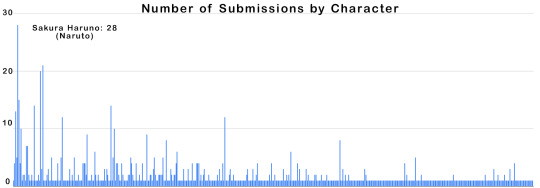
Look at Sakura, fucking up my chart with her numbers.
On a similar note...


Good god, DC, I know what you did, but add fucking up my charts to your list of crimes.
And now, enjoy some rankings of my favorite things:
My favorite universal sentiment quotes from propaganda are:
She lived she served cunt and then she got killed off super early so that the male characters could experience man pain and also because I guess she would have been too powerful if left alive. [Wen Qing (Mo Dao Zu Shi)]
That design. Dear god. I don't want to live on this planet anymore. [Mitzi (The Queen's Corgi)]
In the end she may have girlbossed too close to the sun, but I support her anger. [Ling Wen (Heaven Official's Blessing)]
the victim of “writer doesn’t understand women and also hates them” disease. [Naomi Misora (Death Note)]
She could 100% kill somebody but nobody ever effing lets her. Rip queen. [Kairi (Kingdom Hearts)]
My favorite raging at a writer quotes from propaganda are:
1. You took every single protagonist to weird lion heaven, Clive, but suddenly Susan isn't good enough. [Susan Pevensie (The Chronicles of Narnia)]
2. Being a woman written by Joss Whedon should automatically entitle her to financial compensation tbh. [River Tam (Firefly)]
3. A lot can be summed up in a couple words, namely, "Furman, why?" [Arcee (Transformers)]
4. Can you tell respect women juice ran in Tolstoy's veins. [Lise Bolkonskaya (War and Peace)]
5. TIE: (specifically a guy called Dan Didio, who we all hate) [Stephanie Brown (DC Comics)]
5. TIE: until Geoff motherfucking Johns comes into the picture [Pantha (DC Comics)]
My favorite quotes from propaganda that have nothing to do with misogyny, y'all are just funny:
I wish I could use bold here, because there's no such thing as uppercase numbers. [Arcee (Transformers)]
the most convoluted and lore dense piece of media this side of the afton criticality. [Jane Crocker (Homestuck)]
ended up starting a gang war by accident [Stephanie Brown (DC Comics)]
Ashfur, who later turns out to be a murderous incel [Squirrelflight (Warrior Cats)]
Hawkfrost is actively seeing Brambleclaw and his evil father in cat hell. [Squirrelflight (Warrior Cats)]
193 notes
·
View notes
Text

HC that it really bothers Lockwood that Lucy's mom pulled her out of school so young to become an agent that she missed out on the more engaging parts of formal education. And of course Mrs. Carlyle wouldn't hire tutors to fill in the gaps for Lucy, or even enroll her in the free supplemental schools that the church missions put on for night watch kids and lower income agents.
So on quiet evenings at home, when they're not on a job, or their job wrapped up fairly early, Lockwood, Lucy, and George hang out in the library with the fireplace going. Lockwood selects one of the literary works he enjoyed, or that stuck with him. Sometimes it's Shakespeare, or Melville, or Tolstoy; occasionally it's one of the Austens, or a book of poetry, and for a few memorable weeks, it was the Ramayana. He sits in his armchair and reads it aloud.
Lockwood has a natural cadence to his reading; it comes from the internal rhythm he uses while fencing. He reads aloud to the other two, and he does all the voices, because Jessica used to read to him that way. His naturally deep voice has to jump to falsetto for most of the female characters, and it always makes George and Lucy laugh. But he loves that sound, them laughing, so he keeps doing it.
On cases that required a lot of Touch, or when George is feeling particularly in need of comfort, he'll come into the library after his bath and settle on the floor in front of Lucy instead of beside her on the couch. She'll twist his wet hair around her fingers to make little defined curls, instead of the fluffy crop he usually gets by running a brush through it after letting it air dry. If he sleeps carefully enough, the curls will stay for a day or two, and the girl who runs the microfiche desk at the Archives will always compliment him on his "hairstyle".
So the three of them will sit with the comforting crackle of the fireplace as a backdrop, while Lockwood's voice takes them on adventures of the mind, creating characters and stories and places in their imaginations that they can take back out and relive during quiet, tense evenings waiting for Visitors to show up in haunted houses and gardens and basements. In this way, he can give them whole worlds.
#lockwood and co#lockwood & co#anthony lockwood#lucy carlyle#george karim#save lockwood and co#Strouds Appreciation#I imagne them in day to day life so much
234 notes
·
View notes
Text
My thoughts about The Private Life of Sherlock Holmes:
Let's start by summarising the movie -
No crime-solving happens in the first 34 minutes. The first act is all about Holmes and Watson's dynamic, exploration of the nature of their relationship with each other, etc. If you're the type of person who only watches/reads Sherlock Holmes for the cases, you'd believe this portion is skippable. Only the blink-and-miss detail about the "Midgets' case" is important as far as Holmes' detective work is concerned.
However, if you think exploring Holmes and Watson's interpersonal relationship and their casework are both equally important, like I do, the first act is GOLD. Most of the Tumblr gifs about this movie are from the first 30-35 mins lol.
1.) Holmes enters and they bicker like an old, married couple.
H: Oh, come now, Watson, you must admit that you have a tendency to overromanticize. You have taken my simple exercises in logic and embellished them, embroidered them, exaggerated them ---
W: I deny the accusation.
H: You have described me as six-footfour, whereas I am barely six-footone.
W: A bit of poetic license.
Not only is this whole scene just delightful in general but the theory about Watson being an unreliable narrator in ACD canon is actually being supported throughout the movie, starting right here.
--
W:It's those little touches that make you colorful...
H: Lurid is more like it. You have painted me as a hopeless dope addict - just because I occasionally take a five per cent solution of cocaine.
W: A seven per cent solution.
H: Five per cent. Don't you think I'm aware you've been diluting it behind my back?
This exchange was lovely. Way to slip in their closeness through a few words.
2.) Watson doesn't think it's odd to barge right in when Holmes is completely naked and taking a bath?
Also, why the hell does Holmes bathe with his bedroom door wide open?
And what's that thing he's taking a bath in called? Does anyone know about this stuff? Was this thing common in that timeline? It doesn't seem to fit a grown man like Holmes.
I have so many questions and I'm speechless at the same time. I'll just drop this here:
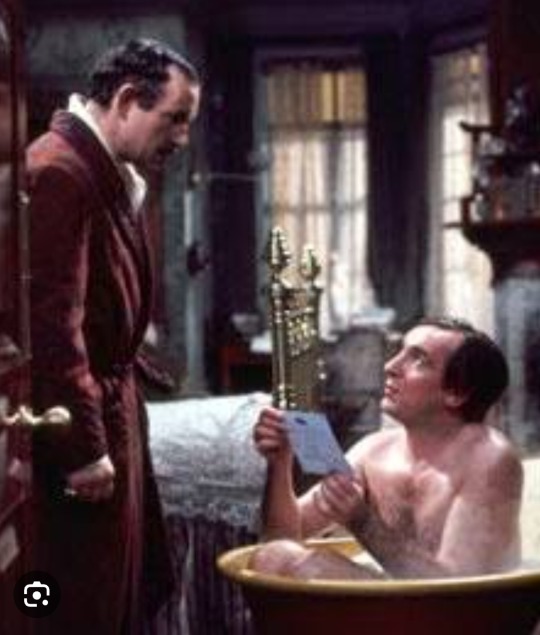
3.) Then Watson persuades Holmes to go to The Swan Lake ballet.
Watson enjoys that ballet, a little too much at that, mostly because he's staring at all the women on stage. (We'll get back to this later.)
Holmes on the other hand has dozed off. All he can admire about the most beautiful dancer, Petrova, is her strong arches. Which is... 🏳🌈
Then that whole scene about Nicholai and Petrova and Holmes in the dressing room. XD
Petrova offers a Stradivarius violin to Holmes in exchange for sleeping with her for a week, so that her child would be beautiful like her and brilliant like Holmes.
Holmes gets out of the situation by lying to both of them; saying he's in a relationship with Watson.
Honestly, that whole bit. Just look at the lines:
N: She has been dancing since she was three years old, and after all, she is now thirty-eight.
H: (gallantly) I must say she doesn't look thirty-eight.
N: That is because she is forty-six.
And:
Nicholai: (about Tolstoy) Too old --- Then we considered the philosopher, Nietzsche --
H: Absolutely first-rate mind ---
N: Too German --
Etc. They're all so funny. This whole scene is something else.
In fairness to Holmes, he did try to get himself out of the situation by lying about having hemophilia in his family, or saying that he's unromantic because he's English, etc but Petrova was having none of it.
Watson coming into the room all of a sudden gives so much clarity and calmness to Holmes. He just knows what to say to help himself because of Watson.
This unforgettable exchange:
N: You mean, you and Dr. Watson - He is your glass of tea?
H: If you want to be picturesque about it.
On a side note, I absolutely loved Nicholai's face journey throughout both scenes - in the dressing room, stuck in the middle of Holmes and Petrova's awkwardness, and later on when he asks about the alleged Holmes-Watson romance to Watson after having spread the rumour in the whole room.
I just loved his reactions a lot.
According to this movie-
Caprice of Mother Nature = Gay.
Half-and-half = Bisexual.
Watson comes to know about the rumour, after having had the time of his life with both men and women in the ballroom. Watson is pissed off, he goes home and confronts about the whole thing to Holmes.
They have a row at Baker Street, in which Watson is being extremely heteronormative again. Thinking too much about his reputation without stopping to question his own feelings and his weird fixation on Holmes' love life.
There's that famous line again:
W: Holmes, let me ask you a question. I hope I'm not being presumptuous -but there have been women in your life?
H: The answer is yes -- you're being presumptuous. Good night.
Awesome.
This marks the end of Act I.
The existence of these 33 minutes of the movie is proof that the writing team in this adaptation knows that exploring Holmes and Watson's characters and what they mean to each other is as important as Holmes' casework. Billy Wilder takes this seriously, even though there are some jokes here and there about it.
The whole of Act I is filled with raising questions about Holmes and Watson's preferences, etc. Does Holmes feel love or is he just a machine? Does Holmes feel love for Watson? Does Watson know about Holmes' feelings for him? Does Watson feel the same way about Holmes?
In my opinion, all the answers to the personal questions about Holmes are as clear as a day. What's really questionable is whether Watson knows and/or feels the same way about Holmes or not. Different viewers might draw different conclusions/inferences after watching this movie.
After this, the movie takes a turn because "Gabrielle" enters the picture, and the actual crime-solving begins from here. The tone becomes a bit more serious in this act.
A young woman, completely wet and in shock enters 221 B. Watson has to pay for her fare to the cabbie before he and Holmes take her upstairs to take care of her.
She can't remember anything at first, then from her wedding ring, Holmes gets to know her name: Gabrielle Valladon. Her husband's name is Emile Valladon.
She appears to have temporary amnesia because of getting hit on the forehead and almost drowning in the Thames.
She reveals info about herself that she's from Belgium, her husband was here in London for a job, they used to write to each other, and after some time, the letters from her husband stopped coming. She'd gone to the London police first after coming to this city. She says the police had advised her to consult Sherlock Holmes.
Now, this should make the viewer skeptical of her. Scotland Yard does consult Sherlock Holmes when they need him, but they aren't going to let him have the whole case if there's a situation like this.
Besides, that woman ending up at Baker Street specifically seems to be planned, anyway. Also, there's always this man who keeps waiting for her or someone else's signals on the outside.
I know what we see on screen comes from Watson's drafts on loose pages, but this movie's narration seems to be Third Person Omniscient POV to me. Where the viewer is privy to more information as compared to the characters.
The three of them keep looking for her husband's whereabouts, and she pretends to be helpless, needy, and fragile (to stroke the ego of the men around her, I believe. I mean that could be one of the reasons...) with temporary amnesia throughout most of the movie. Holmes and Watson don't suspect a thing about her as they keep working for her and she keeps sending cryptic messages to the "Trappists" (German government) with her parasol.
The thing I love about this act:
Ilse von Hofmannsthal aka Gabrielle Valladon is actually a competent character who happens to be a woman. We can see something shady is going on with her even though we don't know her real name, but one of the most brilliant people on the planet doesn't suspect anything. He thinks she's just a woman looking for her husband's whereabouts. He thinks her back story is real.
He keeps on thinking that until Mycroft basically tells him in the third act which is why we're able to see for ourselves that Ilse was genuinely able to outsmart Holmes. We don't have to be told by the narrative voice about Ilse's strengths (*cough* unlike BBC Sherlock and a lot of female characters written by Steven Moffat *cough*).
I, for one, felt respectful of Ilse or "Gabrielle" for real. It was quite refreshing to me after having watched some modern Holmes adaptations.
Holmes, Watson, and "Gabrielle" go looking for the cause of Emile Valladon's death after they've found his coffin in the graveyard, in the guise of having a picnic. Holmes and "Gabrielle" pretend to be a married couple - Mrs and Mr Ashdown, and Watson is their valet. The scenes after this point are delightful mainly because of Watson's reactions (which could be read as his jealousy over Holmes, too).
Also, me when Holmes calls Watson 'John' in an archaic Holmes adaptation:

Because of his sort of stupidity, Holmes takes Ilse, a German spy, right in front of the submersible (which he thinks is a mechanical 'monster' that lives underwater) in a boat, along with Watson.
Ilse was trying to grab as much information as she could about that secret project because she was working for her country. Who knew someone would show her the live version of that model so readily (albeit unknowingly)? :P
The three of them are obviously unable to find anything about Emile Valladon, so they go back to the inn room they're staying in.
That's when one of Mycroft's men comes to pick Holmes up and take him to his elder brother. Here's when the third act begins, I think.
Mycroft had warned Sherlock not to pursue "Gabrielle's" case any further during the second act. But Sherlock didn't listen, because a.) he's an empathetic man, and b.) Mycroft can't just order him to do or drop something just because. Sherlock is not a child anymore.
I know Mycroft was only trying to protect Sherlock, and that he couldn't have told him the real reason to stop him at that time, but still.
Either way, months of planning and testing the submersible have gone to waste because Holmes did not suspect at any point that his client, "Gabrielle Valladon" might have just been lying to him since the start. Can't blame Holmes for that. Ilse was meticulous.
Mycroft shows the model to the queen and she strongly disapproves of the model and curses it a lot. Personally, this seemed to be a shitty decision on her part, and I felt so frustrated and annoyed at her in that scene. She didn't even care to hear about its features. She just rejected it on the spot! :(
Mycroft decides to 'give the submarine' to the German government. It's implied that the Trappists were drowned along with the submarine itself in the deep waters. (That's what I gathered from that scene - correct me if my interpretation was wrong).
In conclusion, while Ilse is genuinely able to outsmart Holmes (unlike some writers forcing us to believe it in their adaptation because they told us so), the German government isn't able to go anywhere with the info they've gathered through Ilse because of Mycroft's last move. Moreover, the English government would have sent her to jail, if Sherlock hadn't suggested Mycroft send her back to her own country.
So, in the end, it's a lose-lose situation for all of them.
1.) Sherlock Holmes didn't know that Ilse was faking her name and her whole identity for a long time, so he unknowingly helped a German spy, thinking he was just helping an ordinary client. Ilse almost had him and the viewers could see for themselves that she'd outsmarted him.
2.) Even after Ilse von Hofmannsthal has got what she wanted for her government, as a spy, they aren't able to make use of that info because of Mycroft. And she has to get out of England anyway.
3.) Mycroft Holmes also fails, to some extent, because ages of effort to plan the submersible, hide the plans, and test the model in secret - all of it has gone to waste. The queen doesn't even want to hear him out in the end.
But even if it was a lose-lose situation, the battle was damn intriguing because of the high intellect on both sides - Holmes brothers and Ilse.
Months later, Holmes receives a letter from Mycroft about Ilse's arrest and execution by the Japanese government. Reading that, he's so moved that he can't even finish his breakfast. He gets up and asks Watson for his cocaine supply. Watson tells him, and then Holmes grabs the bag and goes to his room. Holmes shuts himself in, Watson gets up from the breakfast table too, sits beside the fireplace, and begins to write something on a piece of paper. Probably about the case, but for nobody to see.
End of Act III and the movie.
--
I loved the background score of this movie. It's quite touching and refreshing to listen to.
A lot of dialogue exchanges in the movie are so deep if you stop to think about them. It's unbelievable how much writers can convey through a few words. Some of them are quite funny too - particularly from Act I. There's a thin line between being funny and mocking, and TPLOSH didn't cross that. It was nice.
I love this portrayal of Sherlock Holmes. It's clear how deeply they've understood him from the original canon. Pretends to be dismissive and closed off but actually cares about everyone way too much.
I also liked Mycroft in this movie, even if he didn't have much screen time.
About Ilse von Hofmannsthal - I loved her. Seriously, this is how you write female characters, modern writers! People say ASIB is a direct adaptation of TPLOSH, which is true, but I'd prefer TPLOSH over that episode any day, and one of the reasons is the way the female lead has been written in the former. Not exactly a fan of how Moffat wrote her in his adaptation. He did her dirty, I'd say.
Characters like Ilse make me think that the writing team of this movie knew what feminism is. I can't say the same for the modern Holmes adaptation that has been heavily inspired by TPLOSH.
I loved the plot of this movie too. The case in itself was also pretty interesting and kept me hooked throughout. Even if it wasn't exactly resolved finally, and the ending was melancholic.
I wasn't expecting the movie to be this good. Which is why it took me so long to sit down and watch it.
I only have one complaint about this movie - Watson's characterisation.
I mean, Watson wasn't half as bad as I'd expected (I thought he was going to be horrible, based on the snippets of the movie I'd seen before), but still. I like how he doesn't fall into the bumbling idiot stereotype. As far as the casework is concerned, Watson is also quite competent and observant in his own right. He can handle the medical work too.
I've got problems with his heteronormativity, and the fact that when it comes to deducing what lies in Holmes' heart, he's dumb as bricks. It's annoying. Like, it's one thing if he doesn't feel the same way about Holmes, but he doesn't have to be so weird and homophobic about it. Also, I think Holmes should've told him about the truth related to Ilse and the 'mechanical monster'. I've had enough of 'keeping Watson in the dark for his own good', damn it! He should be more in the knowledge.
Watson's character was the only element in the movie that didn't receive justice from the writer. As a Watson-centric fan, I need this to stop happening in future Holmes adaptations. People should see more from his POV too, and stop to actually see where he's coming from, and properly understand his character in the next show/movie/whatever they make.
What I gathered from the movie about the characters and their interpersonal relationships-
Holmes is in love with Watson but doesn't admit it... for valid reasons this time. (side eyes at Watson's homophobia).
Watson is deeply attached to Holmes but sees him as a close friend. I wish he felt the same way about Holmes in this movie, but alas! Though if he doesn't feel that way about Holmes, why the hell does he seem so jealous of Ilse in Acts II and III? This is beyond me.
I think what they've tried to show is that Watson is too close-minded to confront his possibly repressed feelings for Holmes, deep within his heart? Maybe. It could very well be my wishful thinking lol.
But as far as Holmes' feelings for Watson are concerned, it's not even wishful thinking. It's just... right there. I wish the subtext about Holmes' pining were spelled out. I know why it couldn't (the Doyle estate was being a pain in the ass at that time), but still. It's quite clear what they wanted to write as far as Holmes' emotional side was concerned, but they dropped it from the scripts after Act I and decided to focus on the case instead.
Holmes is dismissive of 'Gabrielle' at first, but he becomes sympathetic for her after some time. He reaches out to help her with her situation, and as the plot moves forward, he grows affectionate for Gabrielle/Ilse, which is why he doesn't hold a grudge against her when he realises he's been outsmarted by this woman (even though his ego was mildly hurt for a while).
The way they maintained a balance between the plot and the characters is commendable. I love seeing well-written women in fiction and this movie showed me that.
I was surprised to see how good this movie turned out to be, as compared to my preconceived opinions. The Private Life of Sherlock Holmes has officially become my comfort movie now. Miles ahead of BBC Sherlock, in my opinion.
Thanks to my discussions with @jamielovesjam in a previous post about this movie lol. I wouldn't have wanted to watch the movie if not for the long talk I had with them. Also tagging @gaypiningshit and @helloliriels for further discussion.
End of my unnecessarily long rambling.
#sherlock holmes#john watson#holmes/watson#meta#the private life of sherlock holmes#TPLOSH#sherlock meta#my long ass review of a newfound favourite movie#movie review#gregorovitch being passive-aggressive#Ilse von Hofmannsthal#new blorbo acquired#strong female characters#a lovely movie overall#long post
98 notes
·
View notes
Text
Efficient Writing At Its Best
Is it me, or is there a noticeable jump in quality in No Princess Left Behind? As in, the animation budget seems to double between episodes, the cinematography is stellar, the humour is incredible. And the writing itself becomes so much more enthralling.
What gets me about this jump is that She Ra and the Princesses of Power was already a fantastic show. Each element I mentioned above is already firing on all cylinders. You would think that this show cannot improve any further, but in this episode it does.
Promise is lauded as some of the best She-Ra has to offer. And don't worry, I will get there. But No Princess Left Behind is my favourite episode of the show by far and one of my favourite episodes of television. This is the episode She Ra stops being merely an incredibly well-made show, and starts to become art.
Let me explain.
SPOILERS AHEAD
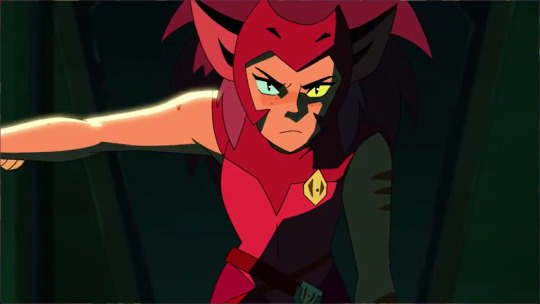
First up, format. This episode is a prison break and both a condensed monomyth and a miniaturised tragedy. None of these things make it great on their own, that's not how writing works. But they are written with incredible nuance derived from character, setting, and the intersections of those tropes.

A prison break is a self-explanatory story structure. A character is imprisoned and either doesn't want to be or has allies who don't want them to be. In the case of the external help variation, as with this episode, the plot functions as a medicine journey with the object of significance being the ally on the inside. (A medicine journey is just a journey to a place to retrieve a thing).
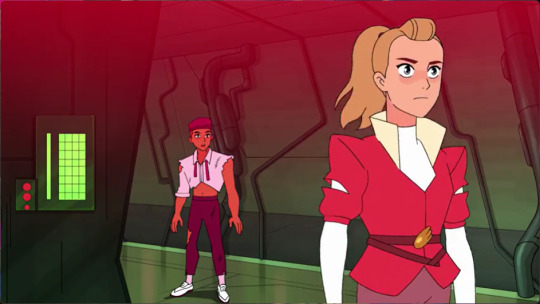
Monomyth is another term for the Hero's Journey. And there are two things about this that need to be understood: The Hero's journey is a set of guidelines, and the Hero's Journey is fluid. By which I mean, the format of the monomyth isn't set in stone, and if a story doesn't follow the specific set of rules you have found, that's not a fault.
In essence, the Monomyth is a set of common events that link multiple stories. Originally proposed in Joseph Campbell's A Hero With A Thousand Faces, the format has been changed over time through interpretation and through people leaving out Campbell's... biases (Misogynistic is an understatement for this guy). The form I am most aware of includes elements such as crossing the threshold, the darkest hour, and the metaphorical death and rebirth, all of which this episode hits in quick succession. If you want more details about the monomyth, I advise reading Campbell's book, or this article by Owlcation. TedEd also has a neat video on the subject.

A tragedy is the most well-known story type. Or rather, you say tragedy, and people generally get what you are talking about. It's a story with a sad ending. But there is more complication than that. Beginning in Ancient Greece, a tragedy is a way of experiencing powerful emotions in a safe environment. Loss, pain, hope, joy. A tragedy is a rollercoaster and is an incredibly good way of achieving that effect. To the point where stories that aren't tragedies (Like She-Ra) are frequently written as them and subverted at the last possible moment. OSP has a video going into detail, but in the interest of this analysis being shorter than a Tolstoy book, the words to understand are these:
Hamartia - Fatal flaw
Peripetea - Reversal of fortune
Catharsis - Emotional release
Bear these in mind because these are situational, and I will be talking about how in a moment. The point is this episode is incredibly efficient at showing each character's strengths and weaknesses and having them affect the plot. Each character has some moments to shine, and that final gut punch is caused by the characters' mistakes. Thats why it hurts, because it was both unlucky and inevitable.
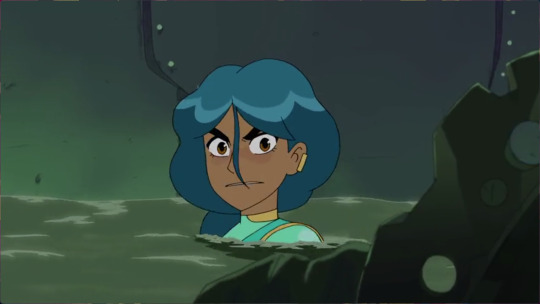
Mermista and Sea Hawk steal the show for me, for completely opposite reasons.
I have always believed, somewhat falsely, that the most well written scenes are those with less dialogue, because the rest of the acting can speak for itself. The minour acting and surroundings can shine if there is less dialogue to distract. Mermista is an example of this, but also an example of why this belief is wrong.
Mermista is the queen of subtlety, with so much emotion and meaning being portrayed by so little. She is exaggerated, sure, but she is a lot more subdued than the entire rest of the cast. What she does have, is expression. In the sewer scene, her head is the only thing visible, and she has more character on display in twenty-two seconds than Swiftwind has in the whole series. She doesn't even speak.
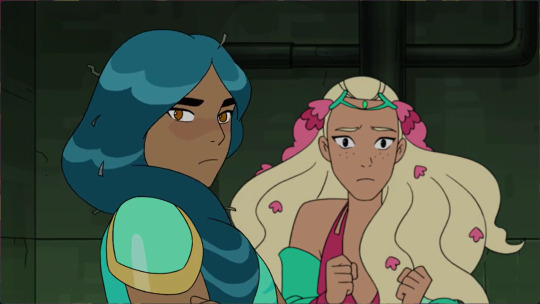
But when Mermista does speak, there is something fascinating happening here. Mermista's lines are saying a completely different thing to her animation, actions, and even the inflection of how those lines are delivered. Mermista goes out of her way to put up a facade of not caring, but she is remarkably affected by her surroundings and the people around her.

For example, despite herself, she grows attached to Entrapta, and gets excited when they work as a team. But I find this gesture so much more revealing. She tears up. But instead of crying, she quietly turns away and dries them. Mermista's Hamartia is also her greatest strength, her distance. She is pragmatic, but she pushes herself too far away to help.
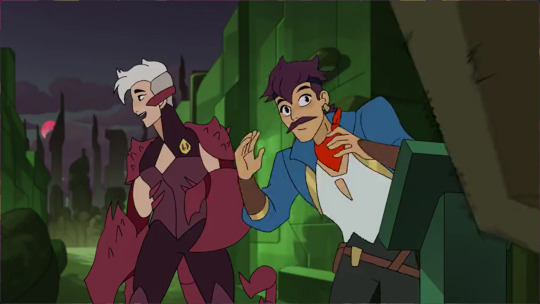
Meanwhile Sea Hawk is a TTRPG bard. This isn't even subtle.
For those who don't know, in DnD and Pathfinder, a bard is a charisma-based class that plays support most of the time (although you can build it in whatever way you want, this is how the class is designed). This means that they often end up as the party face and the glue of the group. There is a prominent live show in which a Bard leaves the party, and it shows off my point exactly.
Sea Hawk is easily the most charismatic character on the group, a fact he uses in a really interesting way. For one, he's distracting. His fast talking keeps Scorpia from being a problem for the group, and in every fight he is in in this episode, his primary role is to distract or annoy his opponents. He doesn't deal much damage, but he keeps himself as a piece on the board that gets on people's nerves and gets them to make mistakes.

Sea Hawk's constant babble is doing another thing for the group. He's reassuring and comforting. His number one priority at all times (successfully or not), is to keep everyone's spirits up. Sea Hawk is a master of inspiring. And would you look at that, DnD and Pathfinder have that as a core ability (Bardic Inspiration and Inspiring Performance respectively).
So, what is Sea Hawk's weakness? His optimism. I don't mean this as "optimism is foolish", I mean that Sea Hawk's hamartia is, much like Mermista, his greatest strength. Sea Hawk is always looking forwards, always keeping the group moving. When someone stops, it doesn't occur to him to look back until it is too late.
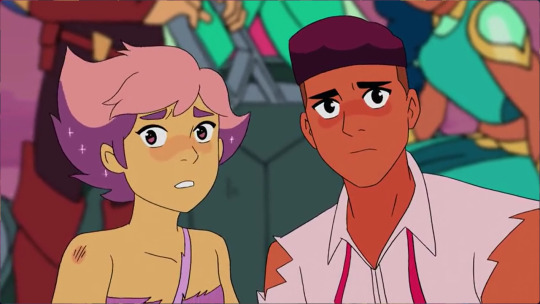
Glimmer and Bow are similar characters to each other, and it is in how they react to stress that that is shown. Both are resilient, but where one is resourceful, the other is relentless.
Bow is a simple character, in comparison to everyone else. Psychologically and physically. He doesn't have powers that can be restricted or that can get him out of trouble. What he does have, is his mind. Bow is clever and resourceful, and he works out a way of getting the right information while imprisoned so that the group doesn't have to work on that later.

Bow thinks big picture, once again his greatest strength and greatest weakness. He can strategize really well, but he doesn't expect the little things. Like Adora's surrender, or like the tiny detail that he overlooks: Entrapta likes robots. It's so small and so natural to him that he takes it for granted.

Glimmer's fatal flaw is obvious already. It's her stubbornness that got everyone into this situation, and that directly causes the end result. This is Glimmer's fault. But Glimmer's stubbornness isn't always a bad thing.
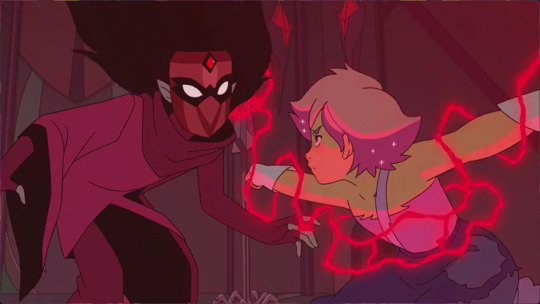
"It's a shame the toll this rebellion has taken on your family. First you loose your father and now..."
"She-Ra will stop you."
"There is no She-Ra!"
Shadow Weaver is a character who specialises in messing with people's minds. She enjoys control, and routinely underestimates the power of determination. To her all those around her are weak willed. But say what you want about Glimmer, the one thing she is not, is weak willed.
I love the line above because it is the first time anyone has managed to actually annoy Shadow Weaver. By this, I don't mean the same type of annoyance as Catra is to her, because I don't think Shadow Weaver cares about her enough to be truly angry. What Glimmer does here is win on Shadow Weaver's home turf.
Shadow Weaver tries to demoralise, and Glimmer blinks away tears, looks her square in the face, and remains stalwart. That's why I think Shadow Weaver shouts here, she's furious, and she can keep posturing, but Glimmer has won this little exchange.
Even with the reveal of the sword, I think its clear just how much Shadow Weaver is rattled, and I think this little exchange is the reason for her actions later on in the series.
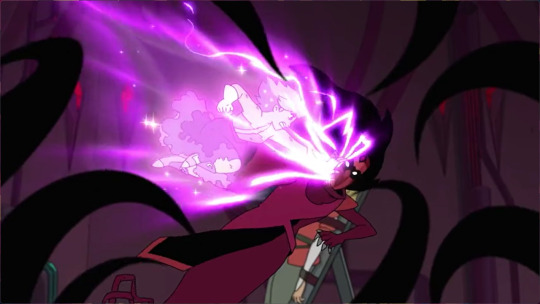
This is also on display here, as once again, Glimmer's raw determination and stubbornness blindsides Shadow Weaver, and it's telling what provoked this. Glimmer is protective of her friends first and foremost. And here, Shadow Weaver pushes too far, and the power of friendship prevails.
It's a minour moment of the theme for the rest of the series. Love, whether romantic or platonic, will overpower anything.
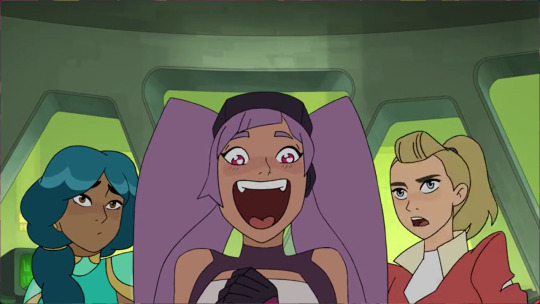
And finally, there is Entrapta. I don't think I need to explain what her strengths and weaknesses are. She's not hiding either.
What's important to note about Entrapta is that she is the convergence of the plot threads I mentioned earlier. The tragedy is her story, and this episode focuses in on that.

Her death scene is so powerful because it is so unfair, and so inevitable. It's quick, and unavoidable in the moment. Thie is the moment when the cost of this war finally sinks in. Yes, things happen later on, but it cannot undermine the gut punch that is this scene, and the final few moments of this episode.
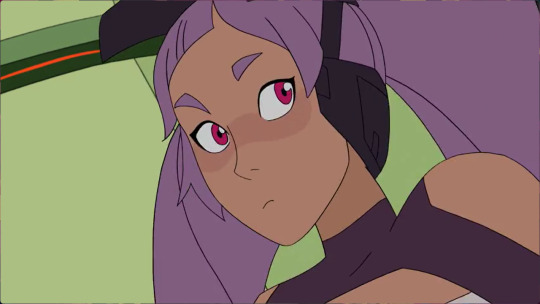
Peripetia is the reversal of fortune, it is the moment when all of the Hamartia comes crashing down and everything thereafter, and the tone changes. In Romeo and Juliet, this is the death of Tybalt (Spoilers).
Here, the Peripetia is the moment when Emily gets stuck, and those flames. It's the look in everyone's face as they realise what has happened and that brief shot of Entrapta's expression before. And it is that infernal siren.
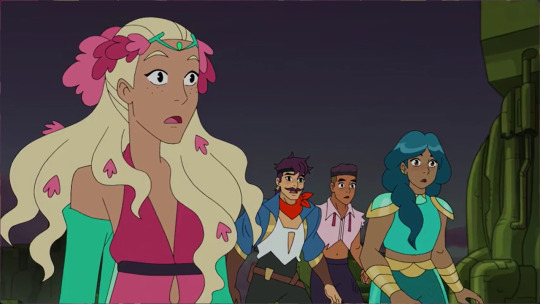
Catharsis meanwhile is the moment of relief, or setting out those emotions. Catharsis is technically not a part of the story, it happens when you stop watching and reflect.
But this episode offers you time to wind down. That brief shot of She-Ra turning back into Adora is powerful not just because of the music, but also because of how empty it is. There is no closure here, and the audience doesn't get it either. The episode ends on this:
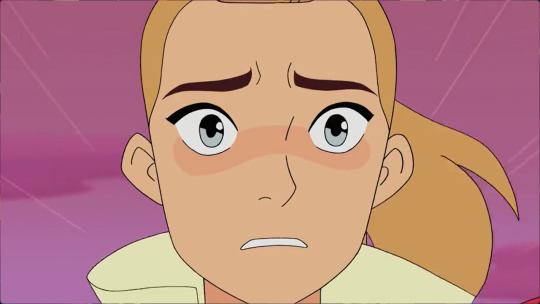
Final Thoughts
I didn't even have time to talk about Catra. She doesn't really do much here, but that scene with the sword is a nice bait and switch. Shadow Weaver is evil, all the characters are at their best and their worst simultaneously and I think that is quite cool.
Oh, and Perfuma. She has an extremely restricted worldview of what teamwork should look like, and Entrapta doesn't fit into that, hence the conflict. I think Perfuma learns to change slightly but doesn't get much time to do so in this episode.
Next week I'll be taking a look at The Beacon, so stick around if that interests you.
Previous - Next
#rants#literary analysis#literature analysis#character analysis#what's so special about...?#she ra and the princesses of power#she ra glimmer#she ra#she ra spop#she ra adora#spop#shadow weaver#glimmer#best friend squad#she ra bow#she ra mermista#she ra sea hawk#she ra entrapta
72 notes
·
View notes
Text
Book!Lucy & Lockwood vs Show!Lucy & Lockwood: A VERY LONG Deep Dive
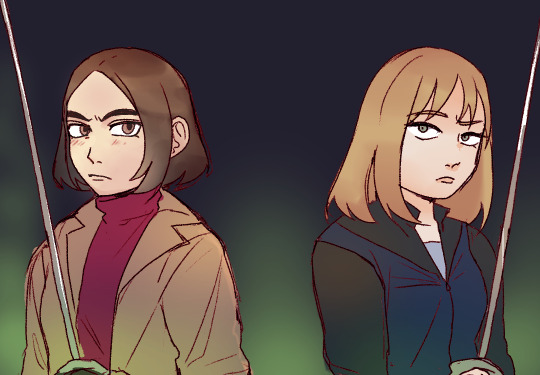
So I finished the Netflix adaptation of Lockwood & Co.
Overall, I think it was a respectful adaptation, which, despite some plot changes, kept largely to the spirit of the books. At minimum, Joe Cornish actually seems to like L&Co, which is way more than can be said about most adaptations these days. Hooray!
But I wanted to write a bit about one of the bigger changes they made: namely the dynamic between Lucy and Lockwood.
I’ve seen people saying that the Locklyle adaptation to screen was very true to the books, just without Lucy’s close personal voice, and sped up a little in the romance department (“Stroud doesn’t mention what Lucy was doing with her hands! They could have been on Lockwood’s face in the books!” etc).
Respectfully, I disagree quite a bit with this. While some argument could be made about it having shades of their relationship from THB/TCS onwards, I actually think Show!Lucy’s attitude towards Lockwood is a 180 from the way she views him in TSS and TWS.
IDK, this might be a bit of a controversial opinion judging by what I’ve been seeing in the L&Co tag and general ways people have interpreted TSS and TWS in the years since their publication, but I’m going to try to back my argument as best as I can, focusing only on those books.
I’m using the original paperback UK editions of both the Screaming Staircase (2013) and The Whispering Skull (2014).
Spoilers for the show and VERY mild spoilers for books 3+ (literally just the name of a new character/type of ghost + stuff already shown in the show that wasn’t shown until later in the books)
Another warning: this analysis is 5500(!!!) words long, and mostly quotes from the book. If you’d like to just read the main bits, look at the intro/conclusion to each section and read the TLDR; at the end.
PART 1: THE NETFLIX SHOW
Before diving into differences, there are things I do think stayed the same between the show and the books:
Lucy and Lockwood banter, swap one-liners and occasionally squabble.
Lucy remains unimpressed with some of Lockwood’s more slapdash schemes.
During missions, they work equally and trust each other with their lives and the job.
They care about each other’s wellbeing.
Basically, when things are going well between them, or when they are in high-stakes circumstances and need to cooperate, there isn’t too much of a difference between Show!Locklyle and Book!Locklyle.
But as Tolstoy (lmao) says, all happy families agents are alike, all unhappy families agents are unique in their own way. With that said, I think the differences between Show!Locklyle and Book!Locklyle are best explored through the way conflicts are handled.
In the show, there are 5 major arguments between Lucy and Lockwood:
Episode 2: Lucy feels upset and hurt because she thinks Lockwood only views her as an “asset”.
Episode 4: Lucy is upset that Lockwood doesn’t believe/doesn’t want to admit that she is talented enough to talk to the Skull
Episode 5: Lucy gets mad at Lockwood being self-sacrificing/death-seeking after they escape from the Winkmans.
Episode 7: Lucy calls Lockwood a boy with a “cold dead heart of stone”, and is upset that he won’t let her and George in on his past.
Episode 8: Lucy is furious at Lockwood using dangerous methods at the auction, that “every relic hunter in London is out to kill us”, and that Lockwood is acting self-sacrificially again.
There are also the following minor squabbles:*
Episode 1: Lucy rolls her eyes at Lockwood for forgetting the chains at Mrs Hope’s house.
Episode 1: Lucy mad at Lockwood and George for the toothbrush cup initiation test.
Episode 2: Lockwood gets annoyed and brusque with Lucy for keeping Annabel’s source and trying to communicate with her ghost. After Lucy is nearly possessed, he flintily tells her he will burn the source, and that they have more important bills to pay.
*Note there might be some more minor squabbles, but they weren’t significant enough to make their way into my notes
The most important takeaway here is that Lucy is the one who initiates most of the arguments! We can also note Lockwood’s response to Lucy’s anger: mostly he mutely self-reflects as she shouts and storms away, then later he comes to her to apologise and promises to do better.
The one time Lockwood gets mad at Lucy (Ep 2) we are a) not shown the bulk of the argument (there’s a cutaway after the fight with the ghost to Lucy justifying herself), b) it’s anger born of worry, and c) Cameron’s delivery of the lines is quite measured and muted.
In essence, when it comes to conflict, Lucy is the one holding the cards in the relationship between the two of them.
We also know the show is set much earlier than the books (which take place over the span of a whole year). Show!Lucy isn’t acting this way out of concern for a Lockwood who she’s known and loved for ages. Rather, Lockwood is someone she is not impressed by at all from the outset. The show is setting up what makes Lucy special here: unlike the adults, the other agents, and maybe even George, she’s the only one who can see through his “prodigious entrepreneur” mythos to the hurting teenager beneath.
Within the logic of the show’s universe this makes sense. Unlike Book!Lucy who is a judgemental grump (and is why she has “no female friends”; TWS p80), Show!Lucy is a more confident girl coming right off the back of losing someone she loves dearly.
Having experienced an arguably greater loss than Book!Lucy at this stage in her life, Show!Lucy seems adamant to prevent anyone else she cares about going down the same path. For Book!Lucy, this is a realisation she only comes to near the end of THB.
So to summarise, in the show, Lucy is a hurting, no-nonsense girl, unimpressed with Lockwood’s antics and objective enough to act as his “chain to earth”. From the way Lockwood responds to Lucy’s upsets, we get the sense that he’s quite sincere and maybe more in touch with his emotions than he shows on the surface.
The show portrays two people gradually learning to trust each other and perhaps slowly, mutually discovering their feelings as they do.
PART 2: BOOK: ACTIONS
The show uses disagreements as watersheds for character development, but they don’t play as significant a role in the books. Still, I went through TSS and TWS and made notes of every time there’s conflict between Lucy and Lockwood because the differences are quite telling.
TSS:
Lucy is mildly irritated/snarky at Lockwood for the entirety of the Hope case in TSS, and is angry when he forgets to bring the chains.
Lucy is angry at Lockwood for talking about the Annabel case and getting her name in the papers (TSS, 231)
Lockwood gets angry and berates Lucy for keeping the Annabel source (TSS, 179-181)
Lockwood calls Lucy “too sensitive” and accuses her of getting too close to ghosts (TSS, 248-249)
Lockwood is furious at Lucy for trying to talk to Annabel again (TSS, 284)
TWS:
Lockwood angry at Lucy for talking about the door on the landing (TWS, 116)
Lucy angry at Lockwood (and George) for taking her Listening for granted (TWS, 258)
Lucy scolds Lockwood for brushing off/slapping down George (TWS, 398)
Purely by numbers, they get mad at each other fairly evenly (rather than it being one-sided from Lucy, a la the show).
But numbers themselves don’t tell a full story. In fact, after looking at the particulars, I was surprised to see just how unbalanced their relationship is in the first 2 books (TSS in particular), and how much Lucy sits under Lockwood’s thumb for the whole thing.
Let’s look:
THE SCREAMING STAIRCASE
The Hope House - Lockwood forgetting to bring the chains.
This is the argument that plays out most similarly to how it does in the books. Lockwood asserts that filings “will be fine” for a job like this. In both mediums Lucy lets him go, but in the show she rolls her eyes and tuts, while in the books she tells herself “now (isn’t) the time”, takes a deep breath and changes the subject. In my opinion, this difference is insignificant.
BUT: in the book, the chains get brought up again. On p39, Lockwood suggests they should leave the house because it’s too dangerous, it is Lucy disagrees and thinks they should stay (as an aside, compare this with Lockwood’s behaviour in the show, particularly when escaping Winkman at the auction!).
Lockwood “condescendingly” tells her that her head isn’t in the right place, and Lucy once again accuses him of making bad decisions by leaving the chains out. Lockwood in turn first blames George (as he does in the show), then goes on to blame Lucy!
How the argument resolves is also interesting. Lockwood smiles at Lucy, and ribs her:
‘How’s your anger management going, Luce?’ (p40).
This effectively defuses Lucy’s rage (she likens his smile to “the sun coming out”).
Only after she’s no longer at the peak of her anger does he admit fault:
“He clapped his gloved hands together briskly. ‘Alright, you win'” (about staying at the house). (p40).
Even in the very first pages, we see Lockwood comporting himself as Lucy’s superior. We get the sense he doesn’t take her anger very seriously. Lucy also doesn’t seem to be able to stay mad at him for long.
Now, I've seen readings of Lockwood smiling in this moment as him being simply unable to stay mad at Lucy. That's definitely one interpretation, but I personally don't agree with it. Lockwood has a patterned habit of using his smile to get out of trouble:
“Lockwood took a deep breath; perhaps he realized he had to explain himself to George and me, as well as to Barnes…(Explanation). He switched on his fullest, most radiant smile.
Barnes winced. ‘Put those teeth away’” (TSS, p426)
And:
“‘Papers that almost certainly don’t exist,’ I growled…I didn’t look at him; if I had, he would have given me the smile, and I wasn’t in the mood for that.” (TWS, p258)
Though as we can see, by TWS Lucy has definitely wised up haha
Lucy’s name in the article
On paper, this argument is similar to the one in the show. The major difference is at no point in the books does Lucy explicitly tell Lockwood to keep her name out of the papers.
In the show, this argument leads to one of its biggest disagreements (Ep 2):
Lucy: I told you to leave me out of it.
Lockwood: And I told you I'd handle it. What are you so worried about? It's all true.
Lucy: We haven't even solved the case yet. What if Hugo Blake sees that and comes after me?
Lockwood: Well, then, we'll look after you, Luce. You're our biggest asset.
Lucy: Asset? Is that all I am, then? Just something to make you money? You think that you do things so differently. But you're just like the rest of them. You're as bad as everyone back home.
In the books, Lucy does not get angry when the article comes out (p217). She only gets upset after she’s pulled in by DEPRAC to see Hugo Blake. When the argument erupts, George is also there and it plays out like this (p232):
Lucy: “Don’t touch me. Because of your article, I came face to face with a murderer tonight, and funnily enough, I didn’t enjoy the experience.”
Lockwood: “Blake is not going to come after us”.
George: “Or if he does, it’ll be very, very slowly, hobbling on a stick. He’s over seventy years old.”
After Lockwood and George’s further justifications about why Blake is not going to “get them” (p232-233) Lucy thinks:
“What (Lockwood) said made sense, as usual. It was good to be out in the night again, with my sword and my colleagues at my side. The distress of my brief encounter at Scotland Yard was slowly fading. I felt a little better.”
We know from this that Lucy’s anger was one borne from worry and fear of Blake. By successfully alleviating that fear, Lucy’s anger at Lockwood dissipates. At no point is she mad at being treated as a showpony or asset by Lockwood. In fact, going back to when the article comes out (p 217), we’re presented with the following:
Lucy: “I still don’t know why you mentioned me but not the necklace.”
Lockwood: “It doesn’t hurt to emphasise what a star you are. We want other clients to come running, eager for your services.”
He doesn’t use the word “asset” here, but you can easily replace the word “star” with the word “asset" to get the original lines that triggered the argument in the show. To this statement, Book!Lucy has no reaction at all (the topic changes).
[As an aside, Lockwood also obliquely calls Lucy and George “inessential” on p214, which they also don’t comment on. Also, at various points he calls George and Lucy “fishwives” (p 272) and Lucy “sensitive” because she’s a girl (p 353) (lmaooo what an ass).]
Lockwood, Lucy and Annabel
I’m lumping these three arguments together because they follow the same pattern: Lucy tries to talk to Annabel, Lockwood gets upset that she keeps trying. What is absolutely fascinating is just how he treats Lucy when he is upset, and how Lucy responds to his anger in turn.
The first argument begins the morning after the fight. Lockwood says:
“Why, Lucy? I just don’t understand! You know an agent has to report any artefact she finds. Particularly one so intimately connected with a Visitor. They must be properly contained.” (p179)
He continues berating her like this (with a lot more anger than he ever displays on the show).
Lucy tries to apologise:
“Yes. I said I’m sorry! I’ve never done that sort of thing before.” (p180)
But Lockwood is still angry:
“So why did you do it now?”
Lucy spends the next page trying to explain why she took Annabel’s source, but even after her apologies and justifications, Lockwood is still furious:
“You forgot? That’s it? That’s your excuse?” (p 181)
The three of them talk a bit more about the mechanics of how Annabel ended up in the house, then when Lucy is in the middle of talking, Lockwood cuts her off again, and they have this whopper of an exchange:
“I hope you’re not trying to change the subject, Lucy,” Lockwood said in a cold voice. “I’m in the middle of ticking you off here.”
I set the case down. “I know.”
“I’m not finished, either. Not by a long chalk. I’ve got a whole heap more to say.” (Lockwood loses his train of thought here). “The point is: don’t do it again. I’m disappointed in you.”
Lucy meekly takes Lockwood’s lecture:
“I nodded. I stared at the tablecloth. My face felt cold and hot at the same time”
Lockwood’s one-sided lecture of Lucy lasts a whole five pages!!!
But he’s not done. It comes up again on p248 where Lockwood accuses Lucy of being 'too sensitive’ (in both the psychic and emotional way), and of getting “too close to (the ghosts)”. Then, in a 180 from the dynamics of power in the show (remember, Lucy threatens to quit several times), Lockwood threatens to fire her!
“You need to be careful, Lucy,” Lockwood said, and his voice was flat and cold. “Wicked ghosts aren’t things to trifle with. You’re keeping secrets again, and any agent who does that is endangering the rest of us. I’m not having anyone on my team who can’t be trusted. You understand what I’m saying?”
Again, Lucy takes this lecture meekly and submissively:
I did understand. I looked away.
In the final argument about the matter (p284) we learn that Lucy is actually a bit scared of Lockwood.
“You deliberately let her free?” Lockwood said. “That was a stupid thing to do.”
When I looked at his face, my heart quailed. “Not free,” I said desperately. “Just…freer.” (emphasis mine)
On p285 Lucy starts crying/tearing up because she thinks Lockwood:
“...Would not forgive me…this was the end of my employment at the company”.
Ordinarily, you might be able to argue that her fears are misplaced and subjective (because of her narrow perspective). This rings a little hollow given Lockwood’s threat on p248.
Does Lockwood ever apologise to Lucy during the Annabel affair? Once, when at his suggestion, Lucy tries to talk to Anabel, and things go awry:
“I’m so sorry. I should have never asked you to do that. What happened? Are you OK?” (p192)
It’s a sign that Lockwood does care about her wellbeing, despite his general distance from Lucy and the way he carries himself, which is as a figure of authority, and more importantly, as Lucy’s employer.
Seriously. We like to joke in this fandom that Lucy is too wrapped up in her own head thinking that Lockwood is out of her league to notice that he actually likes her. But reading the books again with detailed notes, I think Lucy’s impression is actually accurate.
In fact, writing this up sparked a memory of reading TSS for the first time (prior to the release of TWS), I remember thinking there wasn’t going to be a romance between Lucy and Lockwood. I couldn’t articulate it fully at the time, but I imagine it was because of how much older Lockwood seemed and how much control her asserts over her behaviour, combined with the way early book Lucy (to borrow Holly’s words from THB) “can’t say no” to Lockwood.
It is only by the end of TSS, does Lockwood finally say to her:
“I trust your Talent and your judgement and I’m very proud to have you on my team. OK? So stop worrying about the past!” (p436)
It’s still a tad condescending (think: praise from kindergarten teacher) but it’s a momentous occasion because as shown, prior to the Combe Carey Hall case, Lockwood seems to respect and trust her very little. This bookend leads nicely into their growing dynamic in TWS.
THE WHISPERING SKULL
Lucy, Lockwood and the skull in Bickerstaff’s manor:
By The Whispering Skull, Lucy and Lockwood’s relationship has evolved (which would make sense given the 6 months between books 1 and 2) and consequently the way they conflict has too. However, they still don’t ever reach the level of direct conflict they do in the show. Take what I consider to be Lucy’s biggest upset at Lockwood in the first 2 books:
On page 258, Lucy says:
“Forget it! What happened to us treading carefully, Lockwood? I’ve a good mind to go back home!”
Lockwood begs her to reconsider. Lucy remains angry. She says:
“You’re taking me for granted. Me and this house.”
However, it should be noted that although she mentions Lockwood by name, she’s actually angry at both Lockwood and George (yup, he’s there too). She calls them “both mad” for expecting her to agree to their scheme. She then stalks away from them in a rage, leaving “the others” (not just Lockwood) to follow.
In short, her anger isn’t directed at any particular trait of Lockwood’s (such as recklessness or foolhardiness), but rather at having been duped by both George and him. Nevertheless, it shows that she’s become more comfortable at expressing her anger in general by this point.
Lockwood’s door on the landing
As in the show, after the skull tells Lucy about Lockwood’s door, she confronts him about it.
In the show, after Lucy brings it up, Lockwood responds by diverting the subject:
Lockwood: That is not just a nick. You need to get that looked at. Could be some toxins got into your blood.
Then:
Lockwood: You're not Marissa Fittes.
Lucy: Cause you can't handle being my Tom Rotwell? Second best?
(This response is OOFT and also VERY Show!Lucy imo)
Another difference: in the show, Lockwood clearly believes Lucy, but doesn’t want to admit that she might be talented, because he’s used to being the most powerful one.
In the books, Lockwood just flat-out doesn’t believe her:
Lockwood lowered his mug; he spoke flintily. “Yes, I know (the door). The one you can’t stop asking about.” (p116)
He also calls her a “prima donna” (lmao LOCKWOOD).
Here, again, Lucy responds a bit more huffily than she probably would have in TSS:
We stood there, glaring at each other. (p117)
Lucy defends George
I think this argument, from page 398, though minor, nicely summarises Lockwood’s general attitude in conflict.
“Lockwood, we’ve been so blind! He’s desperate to investigate it. He’s been obsessed with it all this time. And you just kept criticising him, slapping him down.”
Lockwood responds at first by doing what he typically does (justify, accuse):
“Yes of course I did! Because George is always like that!...It’s just how he is! We couldn’t possibly have known.”
But compared to the chains argument in TSS where he deflects until the end, moments later:
His shoulders slumped. “You really think he’s affected by the ghost?”
Perhaps it’s because of the imminent danger George is in, but this time he takes Lucy’s anger seriously. Unlike the chains argument from the beginning of TSS, he doesn’t put on airs or “give permission” to Lucy when he senses he’s in the wrong. This way, they work together to prepare to get George back.
PART 3: BOOKS: THOUGHTS
“Wait,” you say, “Doesn’t this just prove that the show is like the books? Sure, it might have skipped that weird employer/employee stage from TSS, but it at least follows their relationship in TWS well, right?”
To this I say, yes, but also no. We need to take into account the role the arguments play in both mediums.
In the books, since Lucy is a very personal narrator, the arguments are a good way of showing the Locklyle relationship unmarked by her own thoughts. Although Lucy is quite inaccurate at judging what people feel and think (see: Holly), she’s not the kind of unreliable narrator that makes up things people say or do.
In the show, since we don’t get to see Lucy’s internal monologue; the arguments are instead used to show how Lucy feels. To that end, I can understand why they made her more direct/in touch with her emotions during them – if she didn’t say anything, the audience probably wouldn’t know.
SO: to get a full picture of her relationship with Lockwood, we need to examine both her acts AND her internal feelings.
What does Lucy feel in the show?
In the show, although Lucy does like Lockwood, she hates (or at least is troubled by) the following: he’s reckless, he’s (over) confident, he’s arrogant and loves the spotlight. But her two primary issues with his character seem to be:
His death-seeking nature:
“What does any of it mean if we end up stabbed or dead at the bottom of the Thames with nobody left to care?“ / “To be honest, the bottom of the Thames used to be a far more appealing place to be.”(Ep 8)
His distance/mystery:
“You might be able to turn your feelings on and off like a tap, but I am drowning here, Lockwood.” (Ep 2)
“At the centre of you is just a…” “A what? A cold, dead heart of stone?” “Yeah, maybe. But who knows, though? 'Cause you don't actually show anyone.” (Ep 7)
Is this the case in the books?
Nope. Not at all. This is the absolute biggest difference between Show!Locklyle and Book!Locklyle.
Lucy has very little to say about Lockwood’s general recklessness because, well, she is reckless too (this is the case in the show as well – makes her look just a little bit like a hypocrite).
In regards to his death-seeking nature: Lucy doesn’t even pick up on it until the Skull of all people points it out, and that is definitely much further along than in TSS and TWS.
But why doesn’t she see these signs? It ties back to how Lucy feels about Lockwood’s distance/mystery in TSS and TWS which is, well: she loves it.
Show!Lucy can’t stand Lockwood hiding things from her and running off madly towards “any old mystery”, and that’s what makes her a good grounding force for Lockwood there.
Book!Lucy fully drinks the Lockwood kool-aid and buys into his grand myth.
From the very outset, Lucy immediately likes Lockwood. Unlike Show!Lucy who compares him negatively with the people “back home”, Book!Lucy thinks:
“Lockwood, I already liked. He seemed a world away from the remote and treacherous Agent Jacobs; his zest and personal commitment were clear. Here was someone I felt I could follow, someone perhaps to trust.” (TSS, p 112)
We also get Lucy’s opinion of Lockwood “throwing himself” into missions the very first full day she joins:
“Vigorous and energetic, eager to throw himself into each new mystery; a boy who was clearly never happier than when walking into a haunted room, his hand resting lightly on his sword hilt…It already pleased me to think of walking into darkness with Lockwood at my side.” (TSS, p 127)
She starts buying the “Lockwood narrative” very quickly too. When Lockwood says:
‘This will be one of the three most successful agencies in London…And you can be a part of that, Lucy. I think you’re good, and I’m glad you’re here.’ (TSS 129)
Lucy thinks:
“You can bet my face was flushed right then – it was a special triple-combo of embarrassment at being found out, pleasure at his flattery and excitement at his spoken dreams.” (TSS 129)
We see her continued fall into Lockwood’s all-consuming orbit on the next page:
“For a moment, as he said this, it all made perfect sense…when he smiled like that it was hard not to agree with him.” (p 130)
Contrast this to the show, where instead she cooly responds, “Thank you,” then immediately asks: “How do I know you’re good enough for me?” (Ep 1)
Show!Lucy clearly isn’t buying it from the beginning, and continues to not buy it. We can see the difference after the Hope House case when Lucy is talking to George.
George: “Maybe if you'd been more interested before you went charging.”
Lucy: “That was Lockwood's decision. I've only just started. What am I supposed to say to him?” (Ep 2)
George: “You're meant to say no. You have to, or you'll make him worse.”
George is another character who works well to contextualise Lucy’s behaviour towards Lockwood. In the show, George sees Lucy as someone capable of reigning Lockwood in. Whereas in the books, he sees Lucy as equally at fault for being reckless.
“When is going to be the time? When you and Lockwood are both dead, maybe? When I open the door one night and see the two of you hovering beyond the iron line?...All you and Lockwood care about is going out and snuffing Sources, as quickly as you can! ” (TSS, p 139-140)
Rather than deflect blame onto Lockwood as she does in the show, she says:
“Because that’s what makes our money, George!...If you were less obsessed with it, we’d have done twice as many cases in the last few months…We waited all afternoon for you.” (TSS, p140)
The “makes our money” line sounds a lot like something that would come out of Lockwood’s mouth, and makes me wonder whether she’s parroting something he said at this stage. Conjecture aside, it shows the reader that Lucy is firmly on Lockwood’s side – as established, Lucy “never says no” to Lockwood, and everyone else knows it.
I suspect part of the reason this continues for so long is because Lockwood never is too approving of Lucy, which causes Lucy to scrabble for the rare moments of his approval.
“Moments before, he’d been promising to incinerate the locket. Now it was the key to all our troubles. Moments before, he’d been giving me a rollocking; now I was the apple of his eye. This was the way it was with Lockwood. His shifts were sometimes so sudden that they took your breath away, but his energy and enthusiasm were always impossible to resist.” (TSS, p 190)
“As usual, the full warmth of his approval made me feel a little flushed.“ (p TWS, 108)
Although by TWS Lucy is far more comfortable with Lockwood to his face, she can’t help but put him on a pedestal at the back of her mind, which marks the remaining difference between the show and the books.
“One full year after my arrival at the agency, the unrevealed details of my employer’s early life remained an important part of his mystery and fascination.” (TWS, p 40)
Even George calls her out on it:
“Oh, come on. You love all that mystery about him. Just like you love that pensive, far-off look he does sometimes.” (TWS, p 55)
Putting aside the “haha Lucy has an obvious crush on Lockwood” part, what’s interesting is that George specifically hones in on Lucy enjoying the “mystery” of Lockwood – although she does want to find out what’s behind the door, she also is drawn to, rather than repelled by (unlike Show!Lucy) the part of him that keeps things hidden. Her encounter with the Fetch in THB shows her precisely what is underneath that mysterious facade of Lockwood’s, and that (combined with Holly) is what, I think, finally scares her out of her idolatry.
As for Lockwood, we can only guess at his thoughts in the book, but we do know that he’s far less open than he is in the show. It is George who reveals to Lucy that Lockwood’s parents are probably dead (TSS, 114).
Lockwood only really brings up his parents (and quickly moves on to other matters) at the END of The Hollow Boy (p 391).
I think he makes a concerted effort to act as Lucy’s employer, to the extent that he hardly asks about or takes an interest in her personal life at all. Compare the line in the show where Lockwood says:
“Interesting outfit, Luce. Didn't have you down as a fan of unicorns. Or rainbows.”
To the book, where not only does Lockwood never comment on Lucy’s appearance, that line is a callback to a line said by George:
“Ooh, Lucy – I’ve never seen you wearing that.” (TSS, p175)
In fact, I’d maybe even go so far to say that the show has snatched bits from George’s relationship with Lockwood and Lucy respectively and repurposed into Locklyle dynamics [see: George worrying about Lockwood’s recklessness, George upset at being treated as an asset (TWS, p107)].
This isn't to say that he doesn't care about them: he very clearly does and it is most clear in moments of crisis. But Lockwood is such a unique character, plus a known Stepford Smiler, and so "typical" signs of feelings of happiness (smiling at Lucy etc) shouldn't be taken at face value when trying to ascertain how he feels – and this is true until THB.
I don’t want people to think I’m cherry picking moments of tension between Lucy and Lockwood to make a point here. Once again, Lockwood does care about Lucy. When Lucy isn’t caught up in her Lockwood-filter, and when Lockwood isn’t preoccupied with his role as THE Anthony Lockwood, they share plenty of moments where they joke, laugh and generally act like teens, which the show captured just fine.
But those moments of cheeriness belie a narrative backbone that is very different. Lucy in the books is just 14 years old, and she’s looking for a (metaphorical!!!) “grown up” mentor after losing her father and being betrayed by Jacobs. Meanwhile, Lockwood is trying his best to shut the door on his childhood and act wiser than his years.
Thus when they meet, Lockwood just happens to be playing that authority figure Lucy thinks she needs (but we know she doesn’t!), and is only happy to oblige by continuing to play that role until slowly Lucy (and George) start breaking down his guard.
TLDR;
Show!Locklyle has a far more balanced dynamic than Book!Locklyle, which is objectively pretty “boss and employee”. Perhaps controversially, I don’t think Lockwood felt anything other than general workplace fondness/friendship for Lucy for most of TSS (at least until Combe Carey Hall).
Most importantly: Lucy in the show hates and is hurt by Lockwood’s secrecy, but Book!Lucy fawns over the very shadow consuming his soul – that is, until her rather rude awakening at the end of THB.
The ramifications of these changes have also spilled onto the characters. Lucy in the show comes off as more strong-minded, practical and confident, whereas book Lucy seems tougher, more of a tsundere (ye) and more love-starved. Lockwood in the show is the same attention-hungry “politician”, but more sincere, troubled and subdued. Whereas Lockwood in the books is crueller (remember that time he threatened to shut a kid in a coffin?), flashier, more competent and a huge brat (affectionate).
Which Locklyle is better is a matter of personal taste. In the show there’s arguably more dramatic tension, and the relationship is more tender/romantic and caring overall. But I think there’s something to be said for how unique Lucy and Lockwood’s dynamic is in the books, and the very carefully written unfurling that takes them to the end of TEG.
Either way, I hope I’ve convinced any readers of this giant word vomit that the show and book dynamics are two very separate beasts.
Agree? Disagree? Found it interesting? Hate my guts? Let me know what you think!!!
Till next time!
#lockwood and co#lockwood and co spoilers#anthony lockwood#lucy carlyle#this thing is absolutely massive i hope it doesn't wreck the app#if i see a typo or factual error after i post i will perish#locklyle#i guess
320 notes
·
View notes
Text
Missed Connections, Natasha Romanov
Word Count: 797

“Just go talk to her.”
“Yelena…”
Nat felt the blush creeping up her cheeks as her best friend and sister Yelena gently punched her in the arm, “come on, I see the way you’ve been looking at her the whole meal. You’re looking at her like she is your dessert. And honestly, I can’t say I blame you.”
“That’s enough.”
“If you don’t talk to her, I will…”
Nat’s blush faded from her cheeks, and she looked at her younger sibling. There was an unspoken argument as the two sisters tried to force each other into doing what the other wanted. After a moment, Yelena got a smirk on her face and scooted her chair out.
Nat’s eyes went wide, and she reached for her arm, “wait…”
“So, you’re going to talk to her?” she asked, quirking her brow, “you’re going to have dessert this time instead of me?”
Nat nodded, upset with herself that her younger sister had managed to get her to do what she’d wanted, “Yeah…I’ll talk to her.”
“Good!” Yelena smiled victoriously, “I’ll wait right here for you.”
Nat nodded and tucked some of her blond hair behind her ear.
Taking a few deep breaths, she tried to tell herself that the attractive woman sitting alone and reading Tolstoy wasn’t intimidating, but the more steps she’d begun to take towards her table, she felt something that she hadn’t felt since she was a child.
Nerves.
Her anxiety kicked into high gear, and her heart thudded so heavily in her chest she thought that she was going to have a heart attack in the middle of the diner in the heartland of America. At the last second, she turned away from the table, forcing herself to go into the bathroom.
“You can do this...you can do this…” she groaned as she forced herself in front of the mirror and placed both of her hands on either side of the sink, “you can do this. Just go out there and talk to her.”
“Huh?”
Nat’s eyes widened. She tore herself from her thoughts and realized that the girl from the table had been behind her, “are you okay, beautiful?”
Her throat went dry. Her lips parted, but nothing came out. Nothing except a soft whimper. The woman, who had spent her entire adult life, and most of her childhood as a spy felt like a lost teenager as she stared helplessly at the woman she was attracted to.
“Are you okay?” she repeated softly as she stepped forward and her hand brushed across Nat’s cheek and forehead, “you feel a little warm and you look a little pale…”
“Oh, uh yeah…” she lied, nearly shaking as the woman’s hand fell down to her shoulder and grazed along the length of her arm, before settling on her hip. Nat swallowed nervously as her eyes met that of the mysterious woman, “you uh-“
“Your friend tried hitting on me after you passed my table,” she informed her, as she cut Nat off. Nat frowned, upset that Yelena had actually gone after the woman when she wussed out, “I told her I wasn’t interested.”
Nat’s eyes snapped up to the mysterious woman’s, “you what?”
“I’ve been reading Tolstoy for nearly an hour…hoping you’d come and say something…especially with how you’d been eyeing me down the whole time.”
The blush that was on Nat’s cheeks fanned down her throat and across her chest as she began to feel warm, “you-you were?”
She nodded, leaning in. Nat felt her eyes instinctively close as she too, leaned towards the other body. And just as she felt her lips grazing that of the other woman’s, something inside of her snapped.
“NATASHA!”
Her eyes snapped open as Yelena snapped in front of her.
A new blush rose to her cheeks as she looked at her younger sibling. Yelena looked amused, and Nat realized that she was leaning halfway across the table.
“Were you trying to kiss me?” her younger sister laughed.
Nat sat back and shook her head, “what? No!”
“You were day dreaming about the gorgeous woman that left a few minutes ago, weren’t you?”
Nat instinctively looked towards the booth where the woman had been sitting. She frowned to see it empty, but her lips parted when she noticed that she’d forgotten her book. Getting up, she rushed the booth before the waitress could get there and she picked it up.
The spine was clearly bent in a way that made her think that she’d read the book nearly too many times. And as she opened the front cover she smiled.
You’re cute. Call me.
Nat bit her lip and smiled as she looked at the number, the ink barely dry as her hands grazed over it, slightly skewing the digits.
62 notes
·
View notes